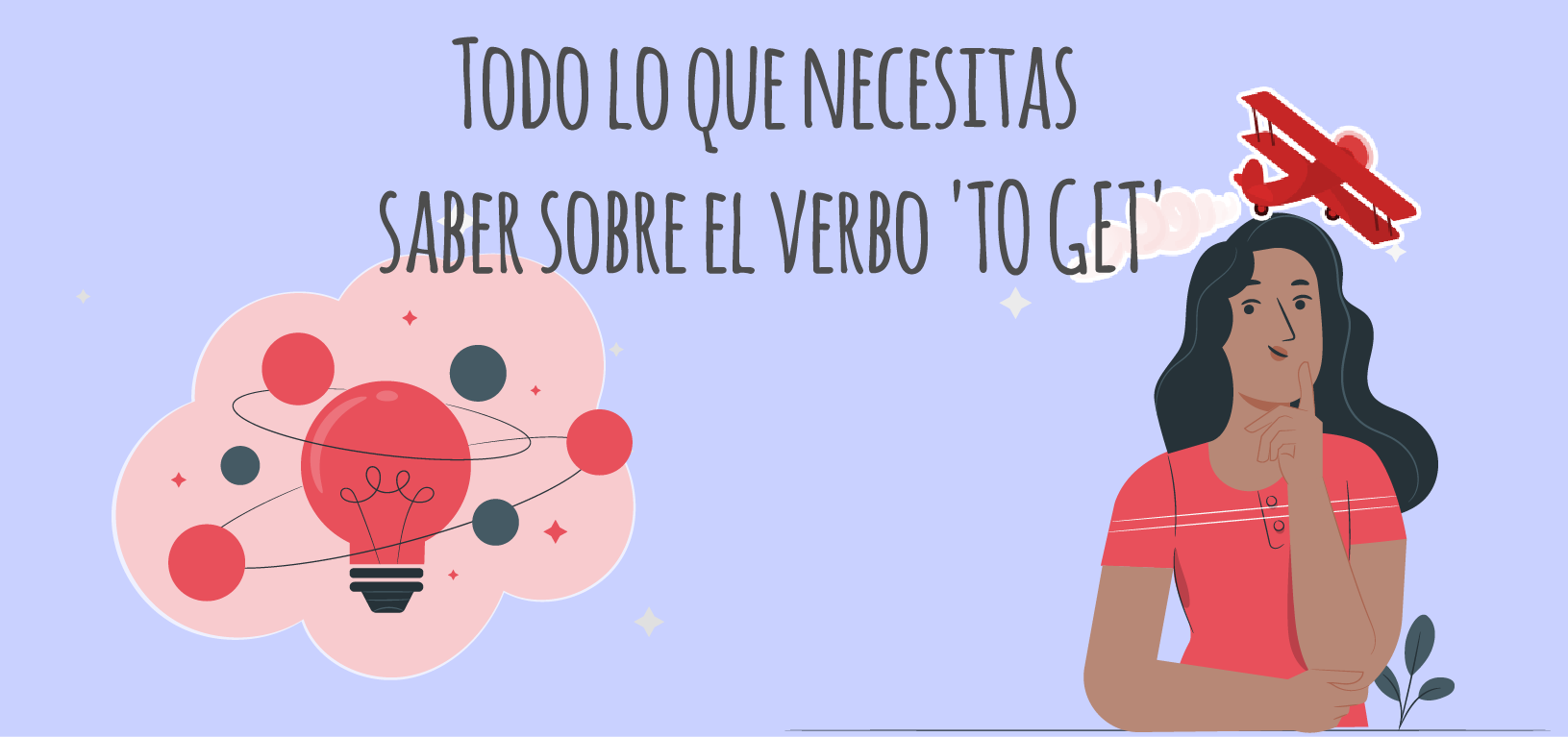Todo lo que necesitas saber sobre el verbo ‘TO GET’

To get es un verbo muy utilizado en inglés, teniendo usos y significados muy variados. Principales significados del verbo TO GET: obtener, conseguir, buscar, ganar. To get es un verbo irregular, y sus formas son “get”, “gets” y “got”. Muchas veces empleamos el participio pasado, “got”, junto al verbo “to have” para hablar de posesión: I’ve got three new video-games that I can’t wait to play! (¡Tengo tres nuevos videojuegos que no puedo esperar para jugar!).
ÍNDICE DE CONTENIDOS
El verbo GET es una de las palabras más importante de la lengua inglesa ¡imprescindible para cualquier examen oficial de inglés!. En esta lección te mostraremos sus significados más importantes con ejemplos en pasado, presente y futuro.
Múltiples usos
Es habitual utilizar el verbo “to get” en casi cualquier situación, es como un comodín. Decimos “get me the glass” (tráeme el vaso) en lugar de “bring me the glass”. También decimos “I get to work” (voy al trabajo) en lugar de “I go to work”. El verbo “to get” tiene fuerza y es como un básico en cuanto a prendas de vestir, pega con todo.
Por eso, no es de extrañar que se lleve bien con prácticamente todas las preposiciones, creando un mundo de significados diferentes que te resultará difícil imaginar. A continuación te enseñamos algunos:
- It’s impossible to get along with my parents, they are very bossy.
Es imposible llevarse bien con mis padres, son muy mandones.
“To get by”
Arreglárselas con lo que uno tiene, apañarse.
- I’ll get by on a short budget during my English program abroad.
Me las apañaré con poco presupuesto durante mi programa de inglés en el extranjero.
“To get away with” / “To get off”
Se utilizan ambos indistintamente para indicar que alguien se ha librado de un castigo por haber hecho algo malo o haber quebrantado una ley.
- He knows how to cheat on her and get away with it.
Él sabe cómo engañarla y librarse del castigo.
Sin embargo, “to get off” tiene más significados. Lo utilizarás para indicar que te marchas de un sitio porque es la hora la hora de irte.
Significados:
La palabra ‘get’ tiene muchos significados y ‘got’ es »get’ en el pasado:
- “Got” puede sustituir el verbo ‘to have’.
- “Get” forma parte de muchos modismos.
- “Gets” también está usando en muchos combinaciones de verbos frases.
Every year I get lovely presents from my uncle.
(Todos los años mi tío me hace unos regalos preciosos).
She gets ten euros a week in pocket money from her parents.
(Sus padres le dan una paga de diez euros a la semana)
They got what they deserved.
(Recibieron lo que se merecían).
| Verbo | Pasado | Significado |
|---|---|---|
| Get | got | conseguir |
Este verbo es uno de los más usamos en conversaciones diarias en inglés. El anterior fenómeno ocurre debido a sus múltiples significados y a las variadas interpretaciones que pueden darse dependiendo del contexto de las conversaciones.
Interpretaciones distintas
Regularmente este verbo significa “obtener”, “conseguir” o “recibir”
- How do you get to the bus station from here?
¿Cómo llegas a la estación de autobús desde aquí?
- How long do you take to get to work every morning?
¿Cuánto tiempo tardas en llegar al trabajo cada mañana?
- Please, could you tell me how to get to Picadilly Circus?
Por favor ¿podría decirme cómo llegar a Picadilly Circus?
- I will get a good grade on the exam.
(Obtendré una buena nota en el examen).
- She got a letter from her father.
(Ella recibió una carta de su padre).
- Did you get my email?
¿Recibiste mi email?
- Where did you get this information?
¿Dónde obtuviste esta información?
- I got a raise.
Obtuve un aumento de sueldo.
Comprar
- I got a really nice car.
(Compré un carro muy bonito).
Vestirse (get dressed)
- She gets dressed at 8 am.
(Ella se viste a las 8 am)
Ir, llegar (expresa el movimiento o el desplazamiento):
- How can I get there?
¿Cómo puedo ir allí?
- To get on (the bus).
subirse (al bus).
- To get in (the car).
Subirse (al coche).
- To get away.
escaparse.
Llegar a la casa (get home)
- We got home late last night.
(Llegamos a la casa tarde anoche).
Llegar a un sitio (get to)
- We must get to the meeting before one o´clock.
Debemos llegar a la reunión antes de las una en punto.
- What time does the train get to Victoria station?
¿A qué hora llega el bus a la estación Victoria?
- I hope to get to work soon because I have to go to the hospital before.
Espero llegar al trabajo pronto porque tengo que ir antes al hospital.
- We got to Uruguay on Saturday.
(Llegamos a Uruguay el sábado).
Levantarse (get up)
- I don’t get up early on Sundays.
(No me levanto temprano los domingos).
Fatigarse o cansarse (get tired)
- When I play basketball, I get tired.
(Cuando juego baloncesto, me canso).
Enfermarse (get sick)
- I got sick on vacation.
(Me enfermé en vacaciones).
Reunirse (get together)
- My family gets together on Christmas Eve.
(Mi familia se reúne en nochebuena).
Entender
- Do you get it? Yes, I got it.
(¿Entiendes? Sí, entendí).
Verbos compuestos con ‘To get’
| Get about
Obtener alreedor | Get at
Llegar a | Get in
entra | Get rid of
Deshacerse de |
| Get above
Llegar arriba | Get away
Aléjate | Get into
Meterse en | Get round
soslayar |
| Get across
Atravesar | Get back
Volver | Get off
Bajate | Get through
atravesar |
| Get after
ir detras | Get behind
quedarse atrás | Get on
Subir a | Get to
llegar a |
| Get ahead
salir adelante | Get by
arreglarselas | Get out | Get together
reunirse |
| Get along with
Llevarse bien con | Get down
bajar | Get over
superar | Get up
levantar |
| Get around
llegar | – | – | – |
Ejemplos:
- Why don’t we get to the beach so we can see the sunset?
¿Por qué no caminamos por la playa así vemos la puesta del sol
- Alan got above himself after being promoted to chief director.
Alan se volvió un engreído luego de haber sido nombrado director ejecutivo.
- How can I get my message across if nobody listens to me?
¿Cómo hago entender mi mensaje si nadie me escucha?
- Tony is always getting after me about how to solve my problems.
Tony se la pasa diciéndome cómo solucionar mis problemas.
- Sally’s really getting ahead in the investigation.
Sally realmente está progresando con la investigación.











